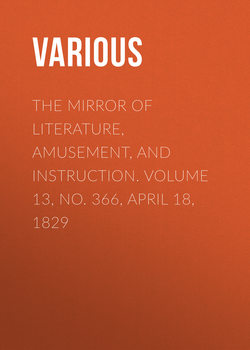Читать книгу The Mirror of Literature, Amusement, and Instruction. Volume 13, No. 366, April 18, 1829 - Various - Страница 6
HARROW SCHOOL
WINE
Оглавление(For the Mirror.)
Sir,—I am induced to send you the following, in consequence of reading an article upon wine in No. 352, page 45 of your interesting work.
The article appears to have been written with a view of inducing a more frequent use of that wholesome and invigorating beverage by adducing a host of respectable names of antiquity. But I am somewhat inclined to believe, that notwithstanding the classic lore and learned style in which the article appears, that many there are, whose adverse temper, and whom the present "march of intellect" has so far rendered callous to authoritative conviction, that they still remain sceptics of the extraordinary good qualities and virtues, which the ancients believed this beverage to contain; only because they have thought fit to adhere to the common adage, that no opinion ought to be received upon men's authority, without a sufficient reason assigned for its correctness. It is with this view of the subject then, that I venture to make the few following observations. In the first place, we will briefly consider the nature and chemical properties of wines, and then their tendency and action upon the constitution.
The characteristic ingredient of all wines is alcohol, the proportion and quality of which, and the state and combination in which it exists, constitute the essential properties of the numerous kinds of wines. The colour of the red wines is produced from the husk of the grape, they being used during fermentation; on the contrary, the colourless wines are those where the husk of the grape is not used during the process of fermentation. The colouring matter produced from the husks is highly astringent, consequently the red and white wines are very different in their qualities, and very different in their effect on the stomach.
All wines contain more or less acid; for British wines are considered less salubrious than those of foreign, from their having an excess of malic acid, which our fruits contain. The foreign wines are reckoned superior in quality, in consequence of their containing an excess of tartaric acid, their fruit containing a greater portion of this acid than does ours. Wines during fermentation, if improperly managed, will produce acetic acid, which will greatly deteriorate their quality.
Various have been the opinions of eminent men on the effects of wine upon the constitution. It would be needless to enter into a detailed account of all those who have written for or against its utility; the following, from a modern eminent writer against the use of wines will suffice, and serve to show that the opponents to wine-drinking have at least some reason on their side. Mr. Beddoes, states, in his "Hygeia," vol. ii, p. 35, that an ingenious surgeon tried the following experiment:—He gave two of his children for a week alternately after dinner, to the one a full glass of sherry, and to the other a large China orange; the effects that followed were sufficient to prove the injurious tendency of vinous liquors. In the one the pulse was quickened, the heat increased; whilst the other had every appearance that indicated high health; the same effect followed when the experiment was reversed. This certainly is a formidable objection, but let us before drawing a final conclusion, examine the opposite arguments.
Wines, and, indeed, all fermented liquors have an antiseptic quality. They act in direct opposition to putrefaction, and in proportion to the quantity of alcohol which they contain, so will be their value and beneficial tendency. Now the circulating fluids of our system have a continual tendency to putrefaction; and the food we take, both animal and vegetable, tends to produce this effect; if, therefore, something of an antiseptic nature, or of a nature in direct opposition to this principle be not received, the fluids would ultimately become a mass of corruption, with the extinction of life. If we meet with an individual whose habits are abstemious, as regards the drinking of wines or fermented liquors, we generally discover him to have a great predilection for that valuable commodity salt
